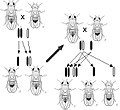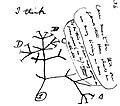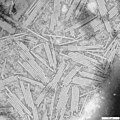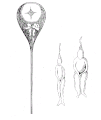Portal:Biology
Introduction


Biology is the scientific study of life. It is a natural science with a broad scope but has several unifying themes that tie it together as a single, coherent field. For instance, all organisms are composed of at least one cell that processes hereditary information encoded in genes, which can be transmitted to future generations. Another major theme is evolution, which explains the unity and diversity of life. Energy processing is also important to life as it allows organisms to move, grow, and reproduce. Finally, all organisms can regulate their own internal environments.
Biologists can study life at multiple levels of organization, from the molecular biology of a cell to the anatomy and physiology of plants and animals, and the evolution of populations. Hence, there are multiple subdisciplines within biology, each defined by the nature of their research questions and the tools that they use. Like other scientists, biologists use the scientific method to make observations, pose questions, generate hypotheses, perform experiments, and form conclusions about the world around them.
Life on Earth, which emerged over 3.7 billion years ago, is immensely diverse. Biologists have sought to study and classify the various life form, from prokaryotic organisms such as archaea and bacteria to eukaryotic organisms such as protists, fungi, plants, and animals. These organisms contribute to the biodiversity of an ecosystem, where they play specialized roles in the cycling of nutrients and energy through their biophysical environment. (Full article...)
Selected article -

Marine biology is the scientific study of the biology of marine life, organisms that inhabit the sea. Given that in biology many phyla, families and genera have some species that live in the sea and others that live on land, marine biology classifies species based on the environment rather than on taxonomy.
A large proportion of all life on Earth lives in the ocean. The exact size of this "large proportion" is unknown, since many ocean species are still to be discovered. The ocean is a complex three-dimensional world, covering approximately 71% of the Earth's surface. The habitats studied in marine biology include everything from the tiny layers of surface water in which organisms and abiotic items may be trapped in surface tension between the ocean and atmosphere, to the depths of the oceanic trenches, sometimes 10,000 meters or more beneath the surface of the ocean. Specific habitats include estuaries, coral reefs, kelp forests, seagrass meadows, the surrounds of seamounts and thermal vents, tidepools, muddy, sandy and rocky bottoms, and the open ocean (pelagic) zone, where solid objects are rare and the surface of the water is the only visible boundary. The organisms studied range from microscopic phytoplankton and zooplankton to huge cetaceans (whales) 25–32 meters (82–105 feet) in length. Marine ecology is the study of how marine organisms interact with each other and the environment. (Full article...)
Selected picture -

The platypus (Ornithorhynchus anatinus) is a semi-aquatic mammal endemic to eastern Australia, including Tasmania. Together with the four species of echidna, it is one of the five extant species of monotremes, the only mammals that lay eggs instead of giving birth to live young. It is the sole living representative of its family (Ornithorhynchidae) and genus (Ornithorhynchus), though a number of related species have been found in the fossil record. The bizarre appearance of this egg-laying, venomous, duck-billed, beaver-tailed, otter-footed mammal baffled European naturalists when they first encountered it, with some considering it an elaborate fraud.
Major topics
Selected biography -
Philip Henry Gosse FRS (/ɡɒs/; 6 April 1810 – 23 August 1888), known to his friends as Henry, was an English naturalist and populariser of natural science, prolific author, "Father of the Aquarium", scientific illustrator, lecturer, entrepreneur, and pioneer in the study of marine biology and ornithology. Gosse created and stocked the world's first public marine aquarium at London Zoo in 1853, and coined the term "aquarium". His 1854 work The Aquarium: An Unveiling of the Wonders of the Deep Sea was the catalyst for the aquarium craze in mid-Victorian England. Over thirty years later, Gosse co-authored a three-volume work on Rotifera (microscopic aquatic animals) considered at the time "the most complete and exhaustive history of the Rotifera in any language", with drawings of "extreme minuteness, accuracy, and beauty".
In addition, Gosse was one of the chief figures among Brethren (British evangelical Christians frequently referred to by the misnomer "Plymouth Brethren"). For over half his life he advanced his religious outlook by lecturing, evangelising, teaching, preaching, and watching for the Second Advent, as well as helping to spread the movement across the world. (Full article...)
General images -
Did you know -
- ... that endemics along the wildlife of Morocco include more than six hundred species of vascular plants and a single species of bird?
- ... that an extract of Alchemilla diademata, a plant endemic to Lebanon, shows antimicrobial activity against Staphylococcus aureus?
- ... that more than 5,000 hen fleas were recorded from the nest of a coal tit?
Things you can do
Related portals
Biology portals
Categories

Anatomy - Anthropology - Astrobiology - Biochemistry - Bioengineering - Bioinformatics - Biotechnology - Botany - Cell biology - Conservation biology - Developmental biology - Ecology - Environmental science - Evolutionary biology - Genetics - Mathematical biology - Medicine - Microbiology - Immunology - Molecular biology - Mycology - Neuroscience - Paleontology - Palynology Parasitology - Pharmacology -
Phylogenetics - Physiology - Systems biology - Taxonomy - Toxicology - Virology - ZoologyMore topics
WikiProjects

WikiProjects connected with biology:
A complete list of scientific WikiProjects can be found here. See also Wikispecies, a Wikimedia project dedicated to classification of biological species.
Associated Wikimedia
The following Wikimedia Foundation sister projects provide more on this subject:
-
Commons
Free media repository -
Wikibooks
Free textbooks and manuals -
Wikidata
Free knowledge base -
Wikinews
Free-content news -
Wikiquote
Collection of quotations -
Wikisource
Free-content library -
Wikiversity
Free learning tools -
Wiktionary
Dictionary and thesaurus


























































